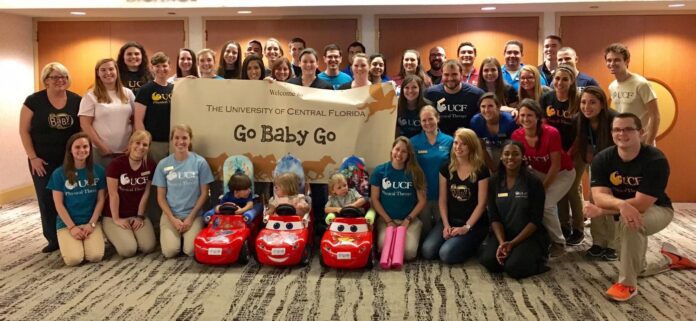Physical therapy experts at the University of Central Florida and other collegiate institutions proclaim that modified off-the-shelf toy cars can drive meaningful mobility opportunities for infants and young children with disabilities. Since 2015, Dr. Jennifer Tucker, a forward-thinking member of UCF’s PT faculty, has directed this playful initiative through Go Baby Go, a national, community-based research, design and outreach program ─ founded in 2012 by Dr. Cole Galloway at the University of Delaware ─ that provides accessible, inexpensive and common-sense solutions for kids with limited mobility.
Go Baby Go aims to promote early, independent mobility through research, advocacy and education. By adapting a battery-operated Fisher Price toy vehicle, Tucker and her team of volunteers grant children with disabilities age-appropriate fun that they may not otherwise experience. The organization employs “go tech” designs which means, says Tucker, “Readily-available technology is used to combine affordable low-tech and high-tech innovations to achieve out-of-the-box creative solutions. It’s about making technology more accessible for individuals with impairments.”
To date, UCF’s Go Baby Go program has custom-built over 50 chairs! “Our initiative is mostly grassroots with application referrals from healthcare partners and local families,” says Tucker. Thanks to donations, sponsorships and volunteer experts and layperson, there is no cost to obtain a car for eligible families (except travel expenses if applicable to recipients who reside outside of the Greater Orlando area).
Go Baby Go typically hosts two workshops a year (in addition to smaller pop up events and individual builds) and attends research conferences to outfit children with custom cars and to educate community stakeholders on the need and methods. Each application is accessed by a pediatric physical and/or occupational therapist to ensure proper adjustments. Next, volunteers, including students from UCF’s doctoral of physical therapy and engineering programs, make the impactful car tweaks. “We change the foot pedal control to a switch on the steering wheel. To work a foot pedal, you need a certain level of motor control and strength, so we remove that element to redirect the control to the steering wheel. This allows the child to experience mobility through a better-positioned control point that they can use with their hands or tummies,” explains Tucker. “We also fit the cars with added structural and postural support. For example, to help a child sit upright, we can provide an additional chest strap and build a frame around the car.”
Clare McCann, an Orlando mom, attended a lecture led by Go Baby Go at the 2016 National Down Syndrome Congress Convention to learn about research findings that might benefit her daughter Katherine, who has Down syndrome and was facing mobility and developmental issues. “One of the things I loved about some of the research Go Baby Go presented was that having the ability to move oneself around ─ as opposed to being pushed in a stroller or on something else ─ helps with brain development, coordination and other skills. So these cars are particularly valuable to those who don’t otherwise have the ability to move themselves around… i.e. my Katherine,” Clare said, who admits to being happily surprised at how quickly Katherine has improved now that she is a driving force of her own mobility. “I believe that having the car has been a contributing factor to such [rapid] growth and development. She’s now crawling, pulling to standing and getting into lots of things.”
McCann is thankful that the Go Baby Go program is invested in researching mobility issues and delivering practical, affordable solutions for families. “We have benefitted greatly from this program and are very thankful for all that they do. It has improved Katherine’s quality of life and enabled her to move and keep up with her sisters in a way she wouldn’t otherwise be able to,” McCann declares.
“The drive for exploration through movement & mobility is a deep part of being fully human.” -Cole Galloway
Tucker stresses that the Go Baby Go cars are not designed as therapy tools but rather used for mobility-related participation and social engagement; although the simply tech adaptions have, adversely, delivered therapeutic benefits, such as increased trunk strength from positioning with postural control. Go Baby Go currently modifies two Fisher Price 6-volt models ─ Lightning McQueen & Frozen ─ and hopes to expand to offer larger car models for older children. Visit ucfgobabygo.org to nominate a child or to support the effort. Go Baby Go also spearheads other mobility projects, such as the Knights on the Go Café, a harness-equipped kiosk that serves as a therapy-based worksite for individuals with traumatic brain injuries (as featured in the January/February issue of AmeriDisability Services Magazine).






